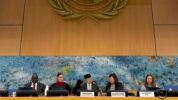COP29 Sees Major Boost in Climate Financing Pledge from Development Banks
A critical issue in the negotiations at COP29 is the promise made by rich nations in 2009 to provide $100 billion annually to support developing countries in transitioning to clean energy and adapting to climate impacts. This funding pledge, however, was not fulfilled until 2022 and is set to expire in 2024. With 2024 predicted to be the hottest year on record, scientists have warned that the pace of global warming and its consequences are happening faster than expected, further underscoring the need for accelerated action.
In the United States, the impact of climate change is evident through devastating wildfires in California and air quality alerts in New York due to smoke from the fires. Meanwhile, in Spain, survivors are dealing with the country’s worst floods in modern history. These events serve as stark reminders of the urgency with which nations must address climate change to prevent even more severe consequences.
Albanian Prime Minister Edi Rama voiced his concerns about the slow pace of international efforts to combat climate change, pointing out that despite decades of discussions, progress remains insufficient. He criticized the gap between the rhetoric of world leaders and the lack of tangible action, saying that life continues as usual, and the speeches, while filled with good intentions, fail to produce meaningful change.
Rama’s comments reflect a broader frustration shared by many developing nations, which have long called for more decisive action from wealthier countries. These nations argue that the burden of addressing climate change should not fall solely on those already experiencing its devastating effects, but should be shared by the wealthier nations that have historically contributed the most to global emissions.



























Tinggalkan Balasan